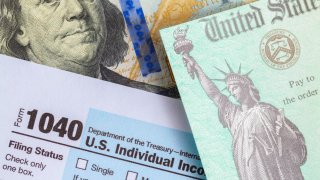
As it continues to disburse the third round of stimulus payments to eligible Americans, the IRS is encouraging those who don't have a permanent address or a bank account to take certain steps to make sure that they receive the money they are owed.
Most of the economic impact payments (EIP) are made automatically: The IRS either deposits them into bank accounts it has on file or mails a paper check to a taxpayer's address.
But if a person is experiencing homelessness, doesn't have a bank account or earns too little to file taxes, it is more difficult for the IRS to get them the money automatically. That is why the IRS created the non-filers tool when the first EIP went out last year.
However, not everyone who is eligible for a stimulus check knew about or could access the non-filers tool, and it is now closed. Millions of Americans could be missing out on, potentially, thousands of dollars in stimulus money.
Get top local stories in Southern California delivered to you every morning. >Sign up for NBC LA's News Headlines newsletter.
But if you have a Social Security number and are not claimed as a dependent on someone else's taxes, you are owed a stimulus payment. Here's what you can do to get the money.
Those who usually don't file a tax return need to do so this year
Even if you had no income last year, or too little to file a return, you should file a basic 2020 tax return this year, the IRS says. That is the only way for the agency to get the information it needs to disburse a payment.
Money Report
When you file that basic return, the IRS will send the check to the address provided on the form.
"People do not need a permanent address or a bank account. They don't need to have a job," the IRS writes. "For eligible individuals, the IRS will still issue the payment even if they haven't filed a tax return in years."
The quickest way to receive a stimulus payment is via direct deposit. Still, that can be inaccessible for some Americans. Millions operate outside of the banking system in the U.S.
The IRS is encouraging those without a bank account to set one up — for free — at a local bank. To help, the FDIC has launched a campaign that highlights 75 banks and credit unions that are offering no- or low-cost accounts specifically for the unbanked. You can read more information about that and search for local accounts on the FDIC's website.
Otherwise, payments will be mailed to the address provided on each return. A person experiencing homelessness who is unable to receive a direct deposit payment can put the address of a friend, relative or someone else he or she trusts, the IRS says. The individual may also put the address of a shelter or a drop-in day center, where he or she will be able to collect mail. The payment will be mailed as a check or debit card to the address on the return.
Claim a Recovery Rebate Credit
When filing the 2020 return, the individual will claim the Recovery Rebate Credit to receive the first two stimulus payments.
Those who earned less than $72,000 in 2020 can use IRS Free File to file a basic return. They will also qualify for free tax help via community programs the IRS has established. The agency suggests finding help on its Free Tax Return Preparation site or by calling 800-906-9887.
Don't miss: Will there be a fourth stimulus check? Here's what we know so far
Check out: Meet the middle-aged millennial: Homeowner, debt-burdened and turning 40






